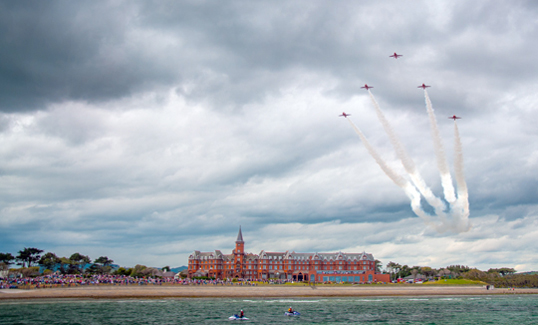Colin McGrath, South Down MLA, has met with Northern Ireland Environment Agency officials to discuss the lack of sand on Newcastle beach.
Mr McGrath said: “I met with the NIEA to discuss the lack of sand on the beach at Newcastle after receiving numerous complaints about the state of the beach recently.
“Newcastle has developed well of late as a prime tourist destination with an improved promenade, shops and restaurants and a town streetscape scheme. But many people say that they would love to see more sand on the beach rather than just the rocks and stones.

“I met with NIEA officials to discuss the problem and it would appear we are the victim of our own success. According to their Marine Biologists, the reason for the lack of sand was the introduction of the promenade itself recently which introduced a hard, concrete wall that the tide washes against when it comes in. The resulting energy and withdrawal of the water takes the lighter sand out and leaves the heavier stones behind. This will make the natural provision of sand on the beach now more difficult.”
Scientists examine shifting sands – 2004. BBC article.
In a BBC article in 2004, it was revealed that the sands had perviously shifted between Ballykinlar and Newcastle both ways across Dundrum Bay, but had recently started to move only towards the former area. However, the scientist who researched this phenomenon said that there was no cause for immediate concern. The finer sand has slowly been removed leaving behind a layer of small glacial rocks an pebbles.

The sand dunes from Murlough to Ballyrkinler have been bolstered by this gradual shift in the sands. The article also reveals that computer model testing was done pre-2004 and the article said: “Using a computer model, they simulated waves moving across the seabed and found a marked change in how the waves approached the shoreline.” The scientists had checked nineteenth century sea charts to compare with contemporary data.
Colin McGrath added: “I am meeting with the Council CEO Liam Hannaway later in the month and will discuss with him other options that might be open. For example, every year in Paris they have ‘pop-up beaches’ which are synthetic but provide the same experience and can be opened at various locations for several months at a time. There may be some locations along the promenade that may be suitable for such an initiative which could provide the experience of going to the beach for tourists and locals.
“It is unfortunate that nature won’t provide the sand needed but I hope that council will investigate any possibilities as people are craving the beach to complete their sea-side experience.”

























